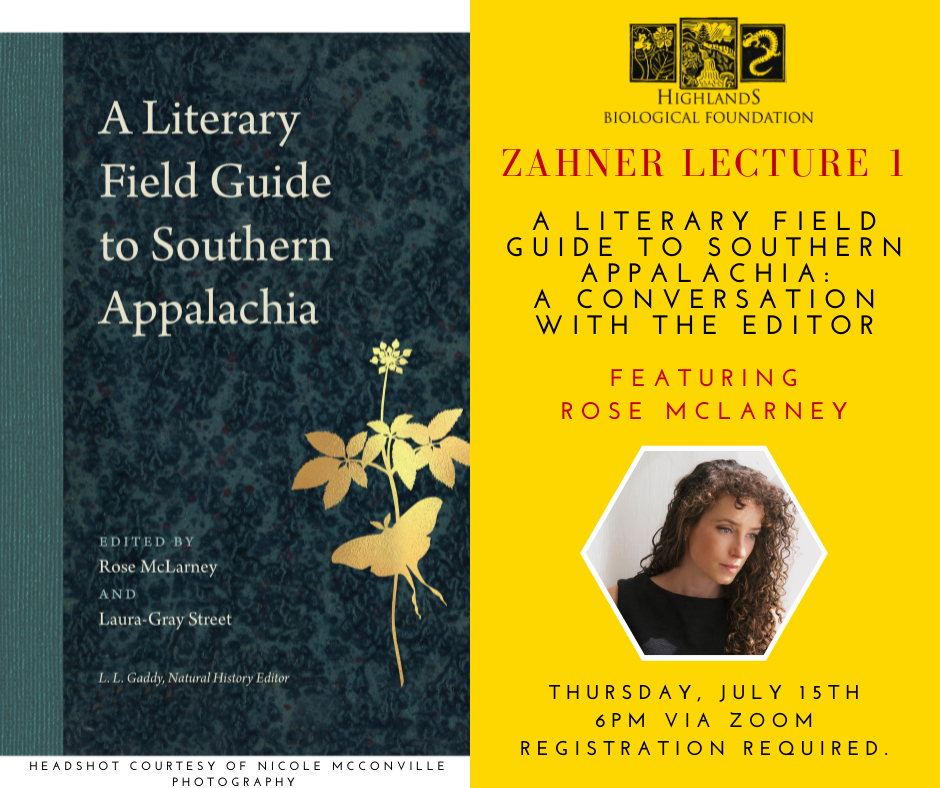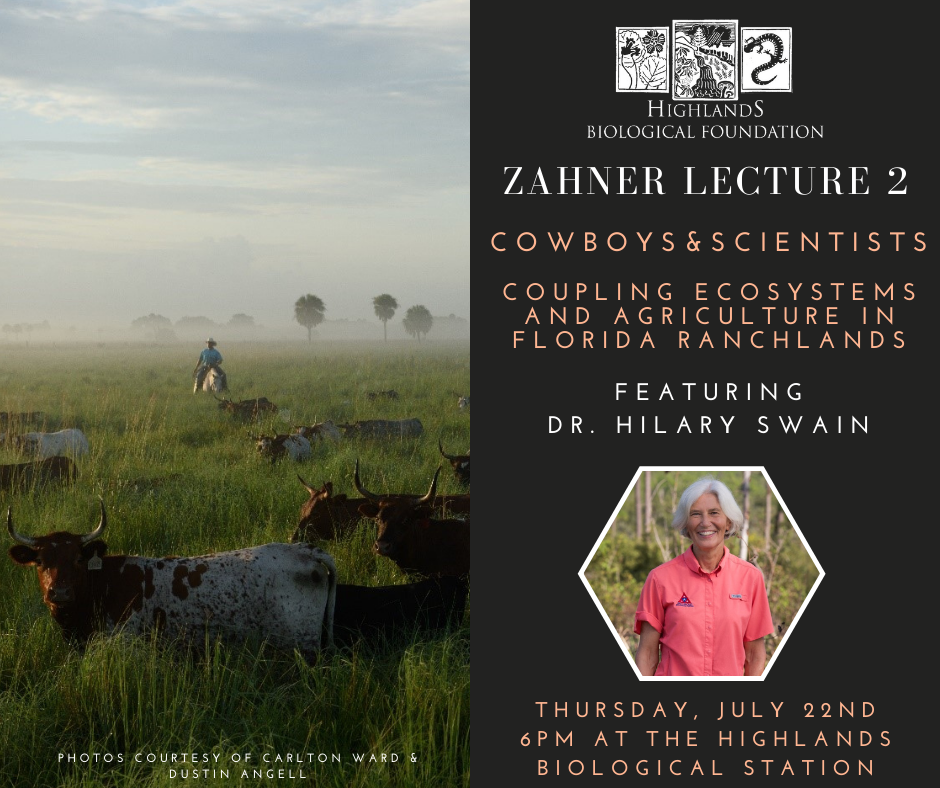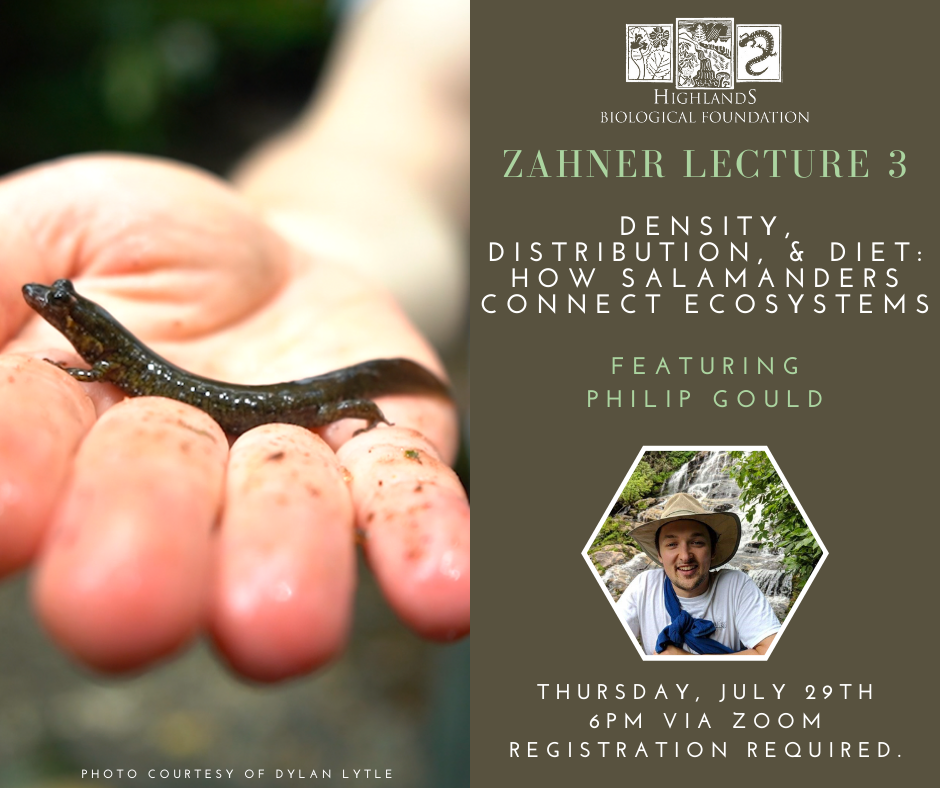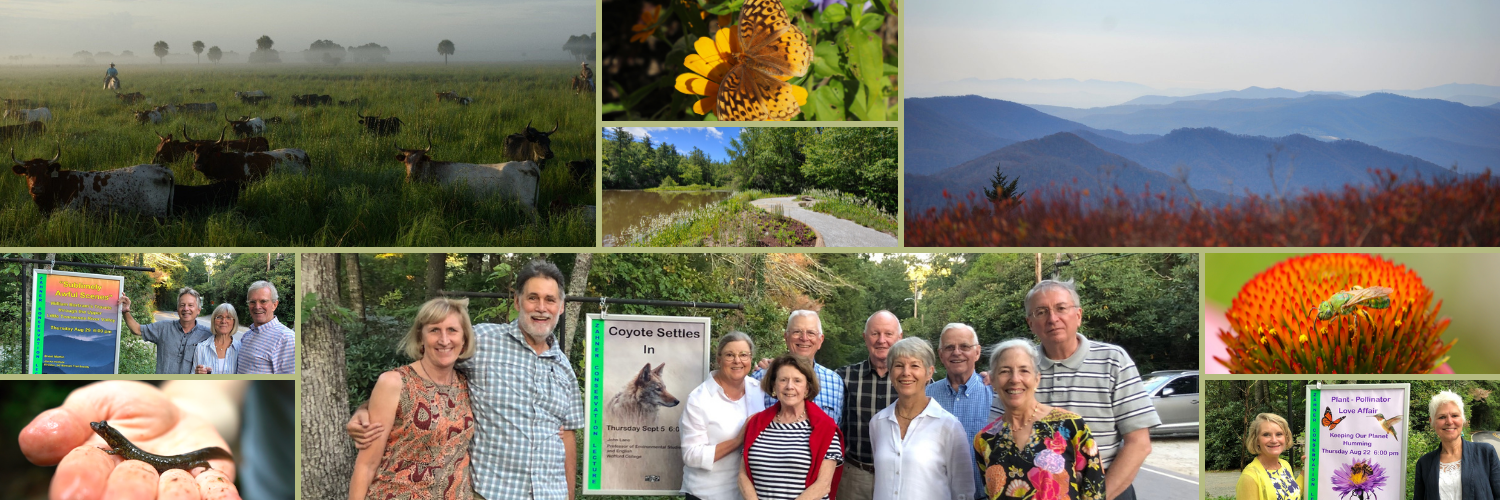
2021 Zahner Conservation Lectures
Lecture 1 - A Literary Field Guide to Southern Appalachia: A Conversation with the Editor
Featured Speaker: Rose McLarney, Associate Professor of English, Auburn University
Date: Thursday, July 15th
Time: 6pm – 7pm Location: Virtual via Zoom
Cost: FREE
Link to purchase book HERE. Also available for purchase at the Highlands Nature Center gift shop.
A Literary Field Guide to Southern Appalachia, a new literary and natural history anthology published by University of Georgia Press, combines natural history information with original art and poems commissioned from the writers who make up the region’s rich literary community. This event will include a reading of poems from the field guide and brief guided discussion of a selection of pieces suitable for both poetry lovers and those who would like to feel more comfortable approaching poems. The editor will also speak about multidisciplinary collaborations, how the natural world informs poets’ craft, and ideas for your own creative writing and nature observations.
Lecture 2 - Cowboys and Scientists: Coupling Ecosystems and Agriculture in Florida Ranchlands
Featured Speaker: Dr. Hilary Swain, Executive Director, Archbold Biological Station – Venus, Florida
Date: Thursday, July 22nd
Time: 6pm – 7pm Location: In-person at the Highlands Biological Station meadow (behind the Nature Center)
Cost: FREE, no registration necessary
Sponsored by Jennie Stowers, Lindy and Robbie Harrison, Kim and Rich Daughtery, Kathy and Bestor Ward, & Amy and Cecil Conlee
Dr. Swain’s talk will introduce Archbold Biological Station and describe its operations, from ridge to ranch to river, in the headwaters of the Everglades, a vast watershed north of Lake Okeechobee, Florida. She will focus on scientific research on Archbold’s Buck Island Ranch, established in 1988, which is a 3,000-head working cattle ranch representative of the region’s subtropical ranchlands. Drawing from the case study of Archbold’s Buck Island Ranch, the talk will address synergies and tradeoffs among cattle production and other ecosystem services on working ranches in Florida, and the path towards sustainable agriculture.
Lecture 3 - Density, Distribution, and Diet: How Salamanders Connect Ecosystems
Featured Speaker: Philip Gould, Ph.D. Candidate, School of Environment and Natural Resources, The Ohio State University
Date: Thursday, July 29th
Time: 6pm – 7pm Location: Virtual via Zoom
Cost: FREE
Sponsored by Frances & Obie Oakley
Ecosystems often rely on processes that import nutrients produced elsewhere. Animals can facilitate the movement of nutrients if they move between different ecosystems or live at the margins of distinct habitat. In the Appalachians, forested streams rely on connections between upland forests and streams. There, salamanders likely have an important role in connecting upland and stream ecosystems. This presentation will delve into current research on how animals connect ecosystems, with a particular focus on what role salamanders have in the Appalachians. The presentation will include results from recent work done in Macon County, supported by the Highlands Biological Foundation and the Highlands Biological Station.
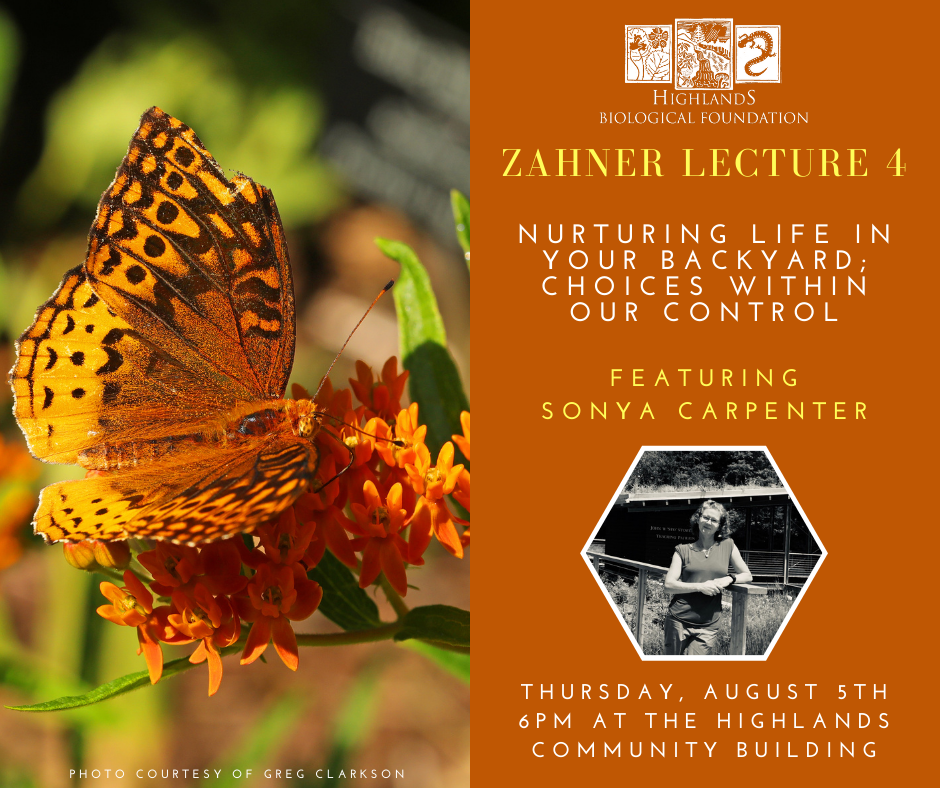
Lecture 4 - Nurturing Life in Your Backyard; Choices Within Our Control
Featured Speaker: Sonya Carpenter, Co-Owner of Canty Worley and Company
Date: Thursday, August 5th
Time: 6pm – 7pm Location: The Highlands Community Building (building located by the Highlands baseball field); MASKS required
Cost: FREE, no registration necessary
Sponsored by Dollie Swanson + Miriam & Vernon Skiles
Over the past year, most of us have had our lives significantly disrupted by forces beyond our control. World-wide crises such as the pandemic and the climate crisis may leave us feeling helpless. By committing to simple changes in our own gardens and communities, we can nurture the other species by improving the environment that we share. Learn more about how native plants support native species of insects, birds and other wildlife and how practices in your own garden can lead to big changes.
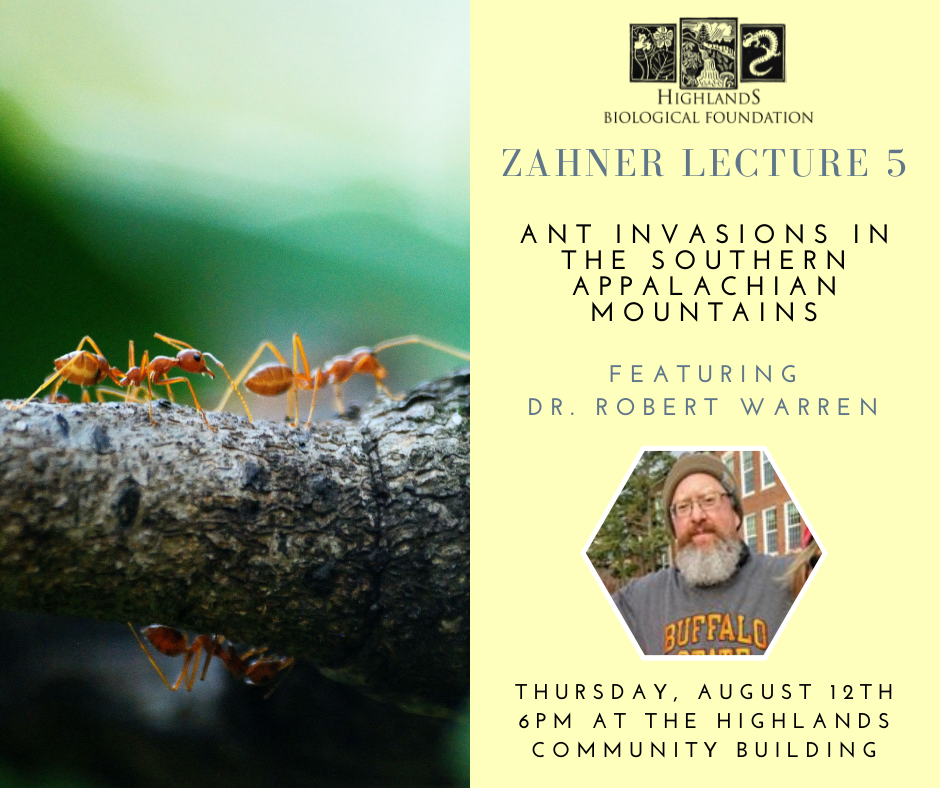
Lecture 5 - Ant Invasions in the southern Appalachian Mountains
Featured Speaker: Dr. Robert Warren, Associate Professor, SUNY Buffalo State
Date: Thursday, August 12th
Time: 6pm – 7pm Location: The Highlands Community Building (building located by the Highlands baseball field); MASKS required
Cost: FREE, no registration necessary
Sponsored by Sarah Morgan & Walter Wingfield
Southern fire ants are working their way into mountain valleys and upward toward high elevations, but rarely enter the forests. On the other hand, Asian needle ants are taking over the foothill and Piedmont regions, and are making forays into the mountain edges. I will discuss how these two non-native ant invaders succeed and how they impact native ants and plants in Southern Appalachian forests.
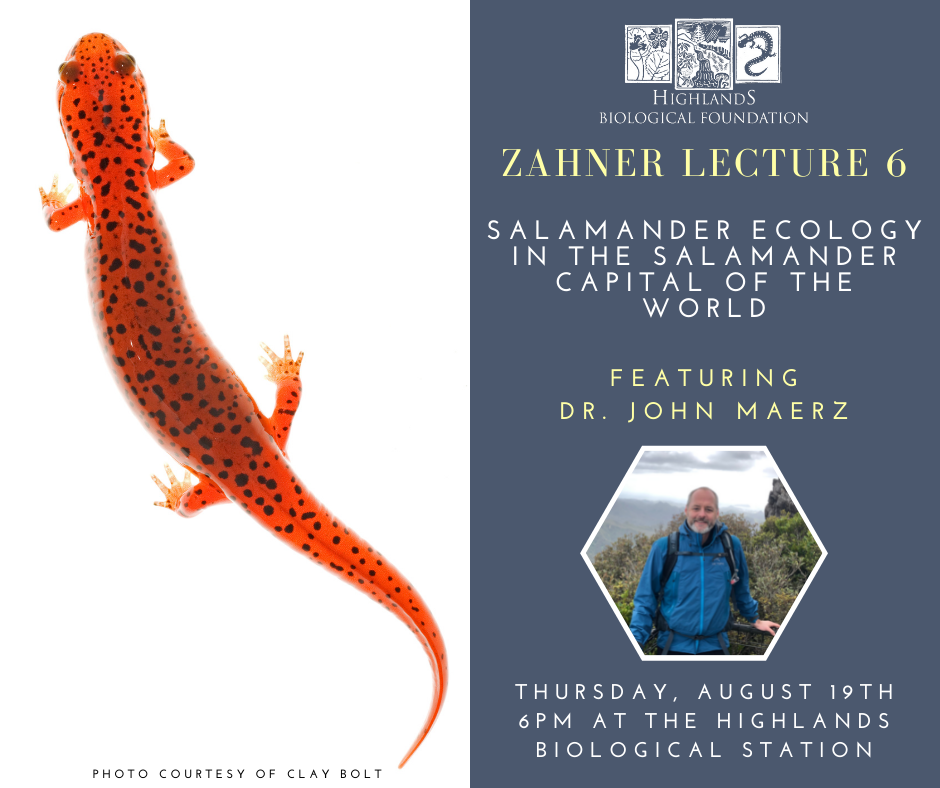
Lecture 6 - Salamander Ecology in the Salamander Capital of the World
Featured Speaker: Dr. John Maerz, Josiah Meigs Distinguished Professor, Warnell School of Forestry and Natural Resources, University of Georgia
Date: Thursday, August 19th
Time: 6pm – 7pm Location: The Highlands Biological Station Amphitheater (behind the Nature Center), registration required
Cost: FREE
Sponsored by Monte and Palmer Gaillard, Melanie and Tom Mauldin, & Martha and Michael Dupuis
While the majority of amphibians in the world are frogs, the majority of amphibians in North America are salamanders. In the Appalachian Mountains, approximately 70% of amphibian species are salamanders. The diversity of salamanders in the region is a product of ancient mountains and steep environmental gradients, and salamanders are influential in key ecosystem processes. A variety of human-forced changes including introduced species, land conversion, and climate change are impacting salamander communities. This presentation will cover the aspects of Appalachian Mountain ecology that create and sustain salamander diversity, the threats to their persistence, and what efforts are underway to conserve these remarkable animals.
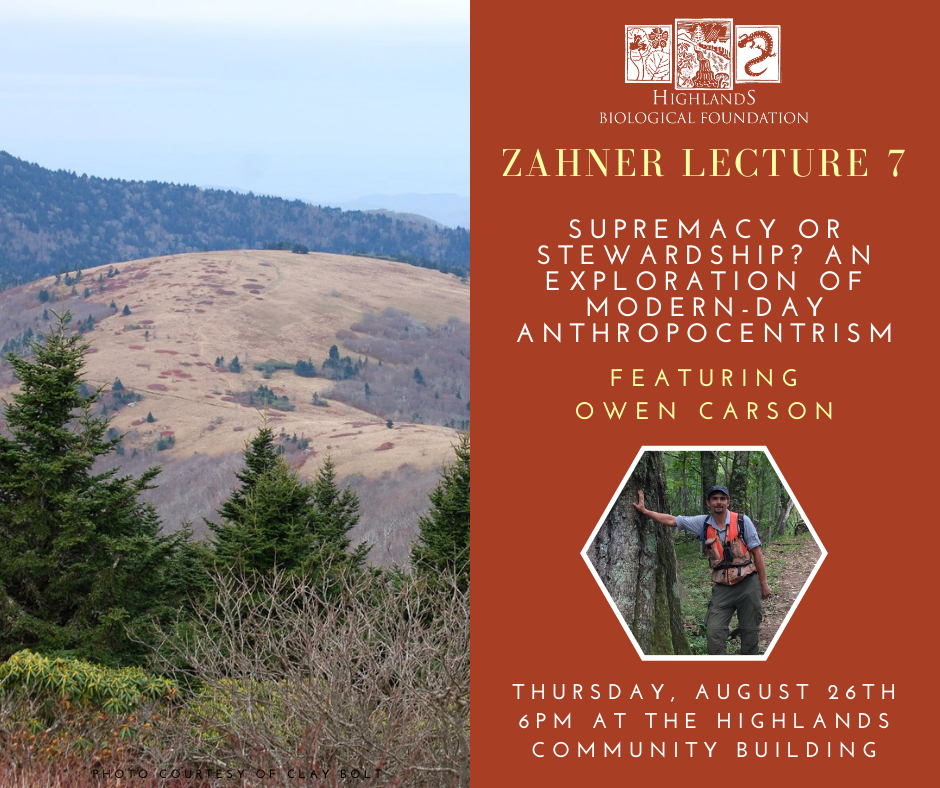
Lecture 7 - Supremacy or Stewardship? An Exploration of Modern-Day Anthropocentrism
Featured Speaker: Owen Carson, Botanist, Equinox Environmental
Date: Thursday, August 26th
Time: 6pm – 7pm Location: The Highlands Community Building (building located by the Highlands baseball field); MASKS required
Cost: FREE, no registration necessary
Sponsored by Kathleen & Jim Milby
For millennia human beings have shaped their surrounding environment to make their lives simpler. From the clearing of forests, to the removal of mountaintops, to the straightening of streams, shortcuts have been created that expedite the exploitation of resources and further the ability of our societies to grow and expand. However, only within the recent past have scientists begun to realize and address the ramifications of our actions. This lecture will explore major anthropogenic changes made to our southeastern landscapes over the past century, the lasting ecological impacts those changes have created, and our recent attempts to mitigate, restore, and prevent further large-scale destruction of natural habitat.
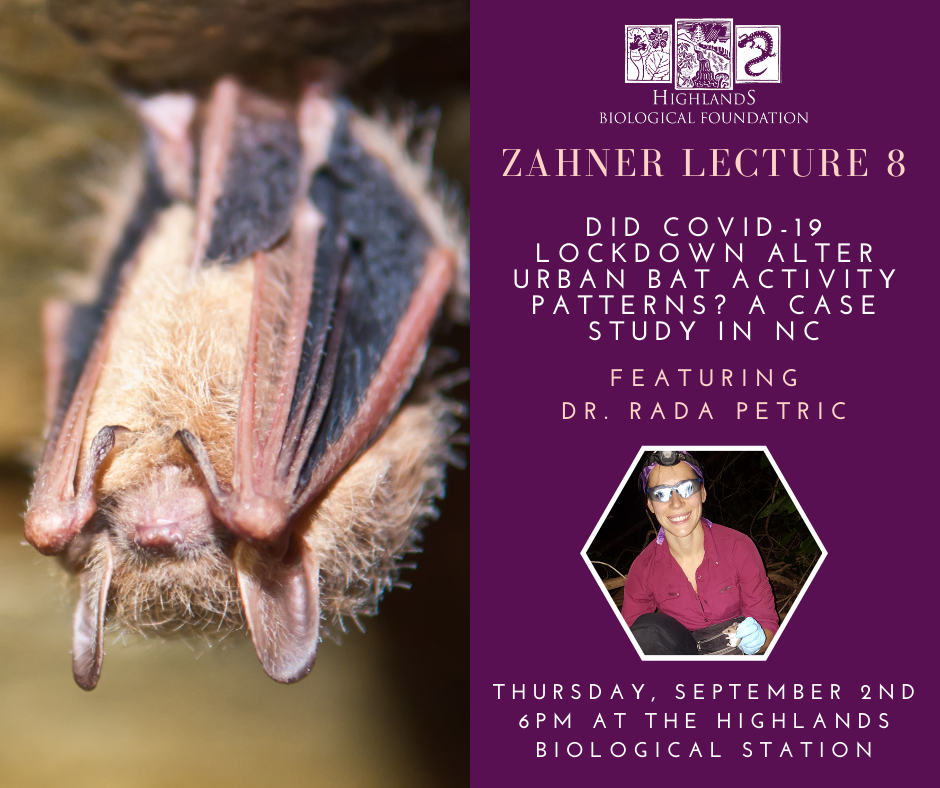
Lecture 8 - Did COVID-19 Lockdown Alter Urban Bat Activity Patterns? A Case Study in North Carolina
Featured Speaker: Dr. Rada Petric, Postdoctural Researcher
Date: Thursday, September 2nd
Time: 6pm – 7pm Location: The Highlands Biological Station meadow (behind the Nature Center)
Cost: FREE, no registration necessary
Sponsored by the Pattersons
Did you know animal activity differs on the weekend when human disturbance is at its peak (called the weekend effect)? So how do animals respond when human recreation ceases during weekends? The COVID-19 pandemic induced stay-at-home orders and eliminated the typical human weekday-weekend temporal patterns, providing researchers with a unique opportunity to investigate the effects of human disturbances on urban bats. Using 2018-2020 year-round bat acoustics monitoring data, Dr. Petric examined bat activity patterns between weekdays and weekends – before and during COVID-19 restrictions at four different sites (2 in the city center, 2 in the city periphery) in Greensboro, North Carolina, USA. This lecture will delve into the findings of this study and explore their implications.
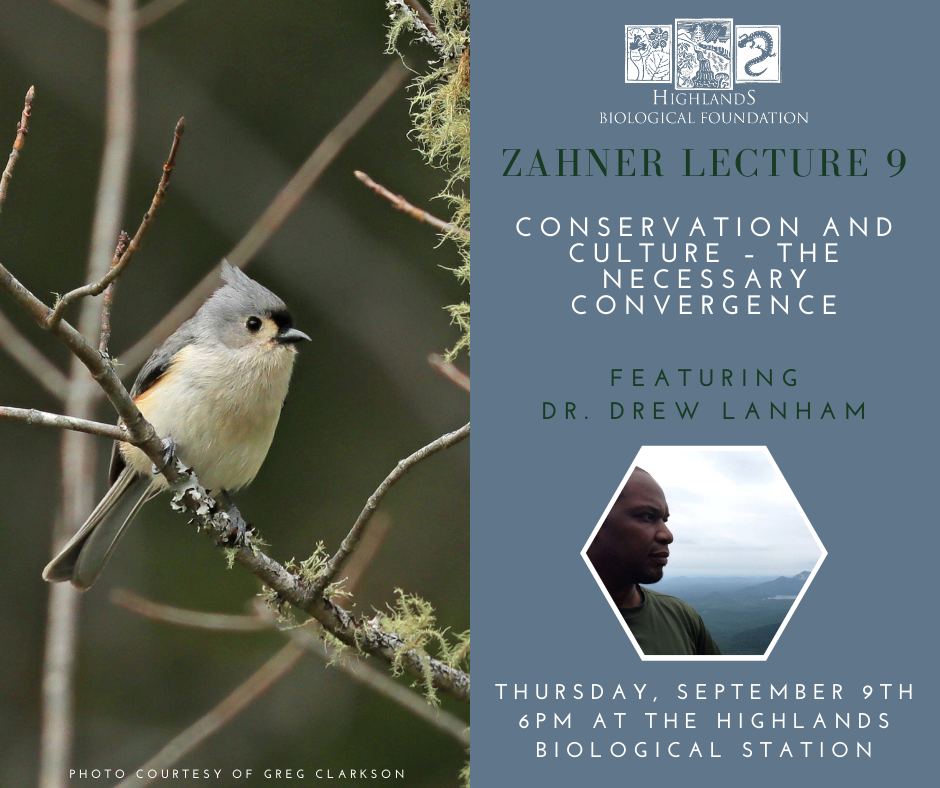
Lecture 9 - Conservation and Culture - The Necessary Convergence
Featured Speaker: Dr. J. Drew Lanham, Alumni Distinguished Professor of Wildlife and Master Teacher, Poet Laureate of Edgefield, SC
Date: Thursday, September 9th
Time: 6pm – 7pm Location: The Highlands Biological Station meadow (behind the Nature Center)
Cost: FREE, no registration necessary
Sponsored by Don and Suzanne Duggan, Tom and Florence Holmes, Adele and Nick Scielzo, & Ruthie and Franko Oliver
Science leads us from phenomenon to facts; the objective data that tells us what’s what, when, why and sometimes how. It is the basis for the “truths’ we know as “ologists”. The heart is the subjective data feeder and filterer. Through it we come to know the facts in different ways that can lead us to care beyond the data to hopefully conserve the world around us. Using birds and his own brand of “cultural ornithology”, Dr. Lanham will blend natural history of the region with a prismed bend through culture, to make conservation “fly” through both head and heart to inspire action as well as deeper thought.

